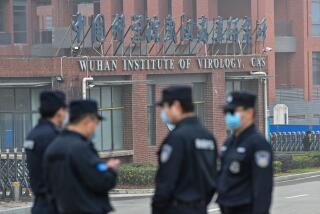Truck Is Tested for Biological Agents
- Share via
WASHINGTON — American forces in northern Iraq have seized a truck that U.S. intelligence officials, eager to end a string of false alarms, said they believe could be a mobile biological weapons laboratory.
No significant quantities of suspicious substances were found on the vehicle, officials said Monday. But U.S. teams are said to be testing residue from equipment in the truck. Preliminary results were not known.
Officials noted that troops in Iraq have reported or investigated scores of tips that proved to be false alarms. But initial descriptions of the vehicle are tantalizing enough to have piqued interest at top levels of the State Department and CIA.
If confirmed, the discovery of a mobile bioweapons lab would provide the first solid evidence to support administration assertions that Saddam Hussein’s regime had a clandestine effort underway to produce lethal viruses and other germ agents as well as chemical weapons.
In a presentation before the United Nations in February, Secretary of State Colin L. Powell said Iraq had as many as 18 trucks used as mobile facilities for making anthrax and botulinum toxin. “They can produce enough dry, biological agent in a single month to kill thousands upon thousands of people,” Powell said. He also displayed diagrams of what the United States believed the mobile labs might look like, with fermentation tanks and control panels mounted on beds of trailers.
Powell based the assertion on accounts of at least four Iraqi defectors, including a chemical engineer who claimed to have supervised one of the facilities and been present during production runs of a biological agent.
The U.S. has never been able to confirm the existence of the vehicles, and intelligence officials expressed concern before the war that the mobile labs -- with nothing to distinguish them from ordinary trucks -- would be exceedingly difficult to find.
Officials said the truck now being analyzed at first aroused little suspicion when it was intercepted by U.S. forces manning a checkpoint on a northbound roadway south of Mosul last week.
“This thing looks like a regular old moving-van truck,” said a U.S. military intelligence official. The forces moved to seize the vehicle, he said, after opening the trailer and seeing suspicious-looking equipment.
“We haven’t found anything like this before,” the official said. He declined to elaborate on the specific equipment found.
Another intelligence official said the discovery of the truck was seen as a potential break because the nature of the equipment found was so suggestive. “It’s different from finding a drum of chemicals that you can get a false positive on,” the official said. Even so, he cautioned, “it’s way too soon” to conclude that the truck was a mobile lab.
Officials said they did not know whether the driver of the truck was still in custody, or why he would have been traveling toward Kurd-controlled territory in northern Iraq.
One official said the driver may have stolen the vehicle and been unaware of its cargo. The military intelligence official said it was also possible that the vehicle was being moved as part of what officials believe is an effort by Iraqis loyal to the Hussein regime to hide or destroy evidence.
The military intelligence official said U.S. forces have recently found trucks loaded with government files “that looked like they were in the process of being hauled away.”
U.S. officials believe Iraq developed mobile weapons laboratories in the 1990s in an effort to evade U.N. arms inspections.
In his U.N. presentation, Powell said Iraq was suspected of having mobile labs. Each truck-mounted lab, he said, had two or three trailers of components that would have to be parked alongside one another and connected.
An Iraqi scientist, who claimed to have worked with the mobile labs, described a 1998 accident that killed 12 technicians exposed to biological agents, Powell said.
Arms experts have expressed concern that deadly agents in the labs could fall into the wrong hands unless they were swiftly located by U.S. forces.
The seizure of the truck is not the first time U.S. forces believed they might have found evidence of mobile weapons labs.
U.S. forces thought they had discovered labs near the northern Iraqi town of Baiji. But officials now say no chemical weapons were found at the site -- which also had 12 55-gallon drums -- and that the “labs” more likely were decontamination facilities or storage containers for other purposes.
Experts cautioned the latest discovery could be another false alarm.
David Franz, a former U.N. bioweapons inspector in Iraq, said experts first need to examine the Iraqi truck to determine if it is “just a truckload of equipment being hauled away from, say, a vaccine facility” or whether the lab equipment is bolted down and “configured with fermenters, centrifuges or whatever to work in a particular way.”
Then, he said, the teams should search carefully “behind the O-rings and joints and other out-of-the-way places where [the Iraqis] forgot to use disinfectant” for residue of biological material that contains DNA. The U.S. has the DNA “fingerprints” of various lethal germ agents.
“If you find anthrax DNA, you’ve still got to make sure it wasn’t a contaminant,” said Franz, former commander of the U.S. Army Medical Research Institute of Infectious Diseases at Fort Detrick, Md.
More to Read
Sign up for Essential California
The most important California stories and recommendations in your inbox every morning.
You may occasionally receive promotional content from the Los Angeles Times.











